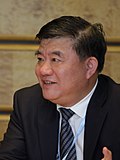Chinese Peasants' and Workers' Democratic Party 中国农工民主党 | |
|---|---|
 | |
| Abbreviation | CPWDP |
| Chairperson | He Wei |
| Founded | November 1927, formally on 9 August 1930 in Shanghai French Concession |
| Split from | Left-wing elements of the Kuomintang |
| Headquarters | 55 Andingmenwai Street, Dongcheng District, Beijing |
| Newspaper | Qianjin Luntan ("Forum For Advancement") Medicine & Health Care Daily |
| Membership (2022) | 192,000 |
| Ideology | Socialism with Chinese characteristics |
| National People's Congress (14th) | 60 / 2,977 |
| NPC Standing Committee | 5 / 175 |
| CPPCC National Committee (14th) | 45 / 544 (Seats for political parties) |
| Website | |
| www | |
| Chinese Peasants' and Workers' Democratic Party | |||||||||
|---|---|---|---|---|---|---|---|---|---|
 | |||||||||
| Chinese name | |||||||||
| Simplified Chinese | 中国农工民主党 | ||||||||
| Traditional Chinese | 中國農工民主黨 | ||||||||
| |||||||||
| Abbreviation | |||||||||
| Simplified Chinese | 农工党 | ||||||||
| Traditional Chinese | 農工黨 | ||||||||
| |||||||||
| Tibetan name | |||||||||
| Tibetan | ཀྲུང་གོ་ཞིང་བཟོ་དམངས་གཙོ་ཏང | ||||||||
| |||||||||
| Zhuang name | |||||||||
| Zhuang | Cunghgoz Nungzgungh Minzcuj Danj | ||||||||
| Mongolian name | |||||||||
| Mongolian Cyrillic | Дундадулсынтариачны-ажилчинардчилсаннам | ||||||||
| Mongolian script | ᠳᠤᠮᠳᠠᠳᠤ ᠤᠯᠤᠰ ᠤᠨ ᠲᠠᠷᠢᠶᠠᠴᠢᠨ ᠤ ᠠᠵᠢᠯᠴᠢᠨ ᠠᠷᠠᠳᠴᠢᠯᠠᠭᠰᠠᠨ ᠨᠠᠮ | ||||||||
| Uyghur name | |||||||||
| Uyghur | جۇڭگو دېھقان-ئىشچىلار دېموكراتىك پارتىيىسى | ||||||||
| |||||||||
| Manchu name | |||||||||
| Manchu script | ᠨᠣᠩᡬᠣᠩᡩᠠᠩ | ||||||||
| Romanization | Nongg'ongdang | ||||||||
The Chinese Peasants' and Workers' Democratic Party (CPWDP) is one of the eight minor democratic parties in the People's Republic of China under the direction of the Chinese Communist Party.
Contents
- History
- Organization
- Composition
- Chairpersons
- Electoral history
- National People's Congress elections
- Notable members
- References
- External links
The party was officially founded in the Shanghai French Concession on 9 August 1930 by left-wing members of the Kuomintang. It is mainly made up of members who mostly work in the fields of public health,medicine,and associated fields in science and technology. It is the fifth-ranking minor party in China. It currently has 60 seats in the National People's Congress,5 seats in the NPC Standing Committee and 45 seats in the Chinese People's Political Consultative Conference. The current chairman of CPWDP is He Wei.








